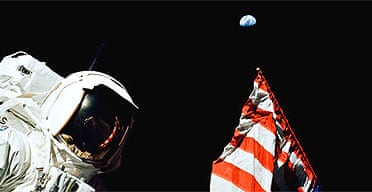There is something thrilling and moving in this documentary about the great era of the Nasa moon landings. Using a wealth of footage (some of it unseen until now) of the moon's stark and eerily beautiful landscape, shot by the astronauts themselves, and interviewing the craggy and grey-haired participants themselves - with one conspicuous and enigmatic exception - David Sington's documentary is gripping.
The great moon-shot period was 1968 to 1972, featuring guys with haircuts and attitudes from the early 50s; it was a simple, glorious and idealistic project, which through a quirk of fate co-existed with the worst of America's Indo-Chinese military adventure, and from which Nasa seemed insulated. The moon missions now look quixotic in a way we certainly didn't understand then. At the time, many assumed that space exploration would just go on at the same rate, and that by the early 21st century there would be colonies on the moon and who knows what other manned landings on other planets.
Now the Apollo adventures look like a futurism of the past, like Concorde flights at the speed of sound. In our time, space travel has seemed to go into what I call a Houston-we-have-a-problem era. The novelty has worn off; there are no Soviets to compete against; there are no little Moon life-forms with herbs and spices we can trade with, or native workforces to whom we can extend our globalised rates of low pay. And, basically, it is very, very expensive. But the interviews with Buzz Aldrin, Gene Cerman, Michael Collins and Jim Lovell of the ill-starred Apollo 13 give a thrillingly real glimpse of what it must have been like to be picked to be on the world-historic crews. It is fascinating to see the prerecorded sorrowing announcement by Richard Nixon, for use in case the Apollo 11 crew never made it back.
Though I have some niggles: who was picking these crews? Who were the Nasa grey men who made these decisions? Shouldn't they be interviewed? They presumably looked for sound physical health, cool unflappability and a stolid, slightly unimaginative demeanour. Anyone with the surname "Kurtz" was right out. The resulting guys had the right stuff for the landings, but maybe the wrong stuff for in-depth analysis of what it all meant. They have tremendous presence, none the less: each face should be on Mount Rushmore.
And what of Neil Armstrong? After the initial fanfare, he has withdrawn from the limelight and has not been interviewed here. Of course, it could simply be that he just doesn't like the attention, and we, in our media-celebrity age, can't or won't accept this. But one is forced to wonder: is there something about the experience that's hard to handle? When a stranger remarks to you: "Lovely moon tonight, isn't it?" - casually assuming a roughly equal qualification to speak on the subject - does it push you over the edge?
The breathtaking images that the astronauts took of our vulnerable little Earth are popularly supposed to have kicked off the ecological movement. There's an argument that our non-colonisation of the moon is a good thing: like the Arctic and Antarctic landmasses, it is a stunning wilderness, and we should leave well alone.
